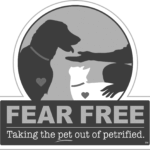At NSVH, we have a special interest in all things dental! Dr. DiGiacomo has undergone specialized training through the International Veterinary Dentistry Institute to learn advanced techniques in oral surgery and preventative dentistry. We have the most modern equipment, including digital dental radiographs and a high speed dental ultrasonic unit. All patients undergoing dental procedures at NSVH receive full mouth radiographs; this allows us to identify oral disease below the gumline and treat it before it may cause your pet pain or infection. Not all veterinary hospitals offer dental radiographs, which are considered the standard of care in proactively identifying and treating periodontal disease.
All of our veterinarians are vocal proponents of preventative dental care, since periodontal disease is the number one disease diagnosed in pet dogs and cats! A healthy mouth means a healthy pet, since oral disease can affect the kidneys, liver, heart and other body systems.
Our dental procedures include:
- General anesthesia with continuous monitoring of vital signs (blood pressure, pulse oximetry, electrocardiogram) by a trained technician
- Intravenous fluid therapy during anesthesia
- Complete oral examination and charting of all teeth
- Full mouth radiographs (x-rays) of each tooth, before and after surgical extraction (if needed)
- Ultrasonic scaling and polishing of all teeth
- Deep root planing and curettage of periodontal pockets, allowing diseased gums to reattach to the teeth, possibly preventing future extraction
- Application of long-acting topical antibiotic gel to heal periodontal pockets and reduce risk for future periodontal disease
- Surgical extraction of diseased teeth, with advanced surgical flaps utilized to extract multi-rooted teeth
- Regional nerve blocks to provide local anesthesia to the extraction sites
- Application of dental sealant to reduce tartar buildup post-procedure
- Pre- and post-operative pain medication
We have many suggestions to keep your pet’s mouth disease free before and after their dental procedure; ask us for suggestions about maintaining your pet’s oral health!
A note about non-anesthetic dentistry
As much as we wish our patients would open up and say “aah” for us, it is not possible for any veterinarian to safely and effectively treat oral disease in an awake dog or cat. The American Veterinary Dental College (AVDC) strongly advises against non-anesthetic dental procedures for pets. Oral disease in cats and dogs cannot be diagnosed and treated safely and appropriately without general anesthesia. To read more about why anesthesia-free dentistry is detrimental, click on this link for more information: http://avdc.org/AFD/category/facts/.



